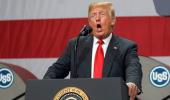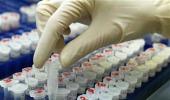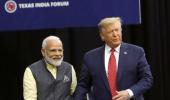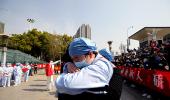United States President Donald Trump has again defended the use of hydroxychloroquine to ward off coronavirus, saying many frontline medical workers agree with him that the malaria drug works in the early stages of COVID-19 infection, despite mounting evidence that it is ineffective in treating the disease.

In May, Trump disclosed that he was taking daily doses of hydroxychloroquine to ward off coronavirus after consulting the White House doctor.
"I happen to believe in it (hydroxychloroquine). I would take it. As you know, I took it for a 14-day period, and I'm here. I happen to think it works in the early stages. I think frontline medical people believe that too -- some, many," Trump told reporters at a White House news conference on Tuesday.
"But the one thing we know: It's been out for a long time, that particular formula, and that's essentially, what it is, the pill. And it's been for malaria, lupus, and other things. It's safe. It doesn't cause problems. I had no problem. I had absolutely no problem, felt no different. Didn't feel good, bad, or indifferent. I tested, as you know. It didn't hurt me, and it's not going to hopefully hurt anybody," he said.
There is no evidence that the drug can fight the virus, and regulators warn it may cause heart problems.
Last month, the US Food and Drug Administration cautioned against the use of the drug for treatment of the coronavirus, following reports of "serious heart rhythm problems" and other health issues.
The World Health Organization says "there is currently no proof" that it is effective as a treatment or prevents COVID-19.
"Many doctors think hydroxychloroquine is extremely successful: the hydroxychloroquine coupled with the zinc and perhaps the azithromycin.. But many doctors think it's extremely good, and some people don't. I think it's become very political," Trump said referring to the controversy surrounding the malaria drug.
"We know from that standpoint -- because it's been so many years, from a safety standpoint, it's safe. I happen to think, based on what I've read -- I've read a lot about hydroxy. I happen to think that it has an impact, especially in the early years. There were some very good tests at Ford, and the doctor from Yale came up with a very, very strong testament to it," he said.
There are no FDA-approved drugs for the coronavirus, which has infected more than 16 million people worldwide and killed at least 655,300, according to data compiled by Johns Hopkins University.
More than 150,000 Americans have died because of coronavirus and over 4.4 million have tested positive.
Hydroxychloroquine sulfate was first synthesised in 1946 and is in a class of medications historically used to treat and prevent malaria. It is approved by the US Food and Drug Administration to treat malaria, rheumatoid arthritis, lupus, childhood arthritis, and other autoimmune diseases.
The drug generated excitement earlier in the year after small studies suggested it could be beneficial, especially when combined with antibiotic azithromycin. Trump promoted it as a potential treatment for the virus and said he used it as a preventive measure against the disease. However, several larger studies showed the drug was not helpful and caused heart issues in some patients.
The drug is not FDA-approved for the treatment of COVID-19 but it has been identified as a possible treatment for the infection and the US government has requested its immediate availability.











 © 2025
© 2025